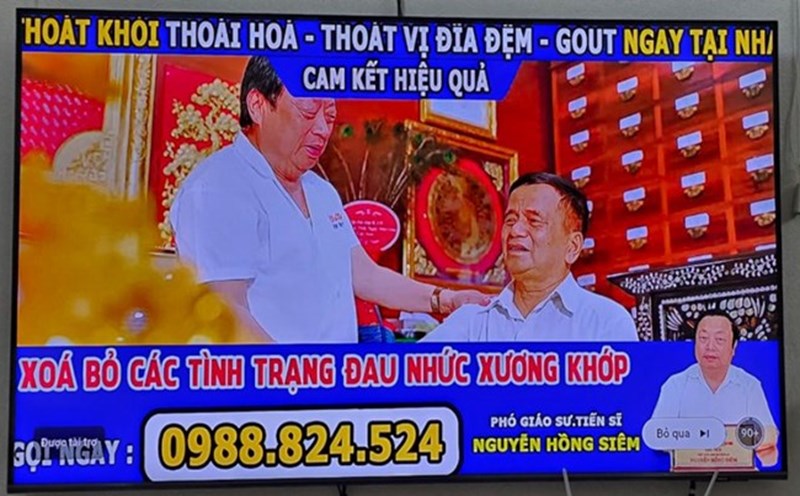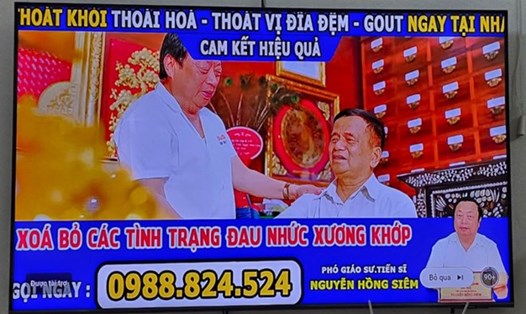"Exaggerate" the benefits
Visiting a functional food store in District 1, Ho Chi Minh City to consult about good products for the brain, Ms. Le Anh Thu, living in Thu Duc City, was introduced by a consultant to an Australian brand with a price of 530,000 VND/bottle of 100 pills.
“The staff introduced this as the best-selling product that is good for the brain. However, after buying it, I drank it regularly but did not see the results as advertised,” Ms. Anh Thu shared.
In particular, muscle-building drugs in the form of pills, injections or functional foods are being sanctified by advertisements with the "miraculous" effect of increasing muscle without exercise. Many people have trusted and bought them without knowing the true effects.
Or on the internet, there is word of mouth about a weight loss injection pen that can reduce up to 15kg in 6 months. With a price that is not cheap from 3.8 to 4.5 million VND/pen. According to the seller, the Spcell GLP - 1 Semaglutide weight loss injection pen has an outer shell identical to a diabetes injection pen and is deified by the seller as a weight loss "miracle drug". To lose 3 - 4kg, inject 2 pens; 6 - 8kg, inject 4 pens; 10 - 15kg, inject 8 pens...
Talking to Lao Dong, Dr. Lam Van Hoang - Head of the Department of Endocrinology - Diabetes, Tam Anh General Hospital, Ho Chi Minh City - said: "Injection pens or functional foods advertised for weight loss that are being sold on the market are not trustworthy and people are advised not to believe them and buy them for use on their own. People should choose a healthy and scientific way to lose weight or improve their body shape, such as combining a healthy diet and regular exercise every day, which is both good for health and helps maintain their figure. Do not trust in "quick" products that burn the process to achieve beauty goals.
Functional foods produced by bucket and basin technology
According to Associate Professor Dr. Pham Khanh Phong Lan - Director of the Department of Food Safety of Ho Chi Minh City, there are products that are called functional foods, but are mainly produced using "bucket and basin technology", that is, buying capsule shells, mixing ingredients and then putting them in. Most functional foods are sold in pharmacies, however, many products advertise beyond the truth, considering functional foods as medicine to treat diseases.
Regulations on the distribution and sale of functional foods sold in pharmacies must have separate areas. However, there are no provisions or regulations prohibiting the sale of functional foods in markets or on e-commerce platforms. Therefore, it is difficult to ensure that people do not confuse them with drugs.
“A difficult problem in handling violations is that most of the establishments operating in the functional food business are just representative offices. Some establishments have an office rental contract to register their business, only put up signs, and do not have any working activities, so the inspection work is still limited in contacting the establishment owners,” said Ms. Pham Khanh Phong Lan.
Associate Professor, Dr. Tran Dang - Chairman of the Vietnam Functional Food Association - was indignant: The phenomenon of violations in advertising functional foods not only causes the consequences of "losing money and suffering" for consumers but also reduces the reputation of the functional food industry, confusing honest businesses with dishonest businesses.
There are four types of ethical violations: False, deceptive, and counterfeit advertising; exaggerated, overblown advertising; ambiguous, misleading advertising; advertising targeting sensitive audiences (cancer and terminally ill patients).
Associate Professor, Dr. Nguyen Thanh Phong - former Director of the Department of Food Safety (Ministry of Health) - said that when being "caught" by the authorities, many companies are blatant and ready to deny the content on the website they are advertising.
If consumers see any of the following signs, they have the right to suspect advertising violations such as using medical staff, the name of medical staff to advertise; using the name of oriental medicine, traditional medicine but in fact it is food to advertise to cure this or that disease is false advertising; using letters, thank you notes, statements of patients to advertise functional foods; advertising functional foods but claiming to completely cure this or that disease, advertising to "push back" diseases...
Faced with this situation, the Ministry of Health requested the People's Committees of provinces/cities under the Central Government to direct strict handling of taking advantage of product introduction seminars to illegally examine and treat diseases, provide advice, sell and introduce functional foods as medicines.
According to the Department of Food Safety (Ministry of Health), statistics from the Vietnam Functional Food Association show that up to 80% of the current offensive advertisements on social networks are disguised as functional foods.











